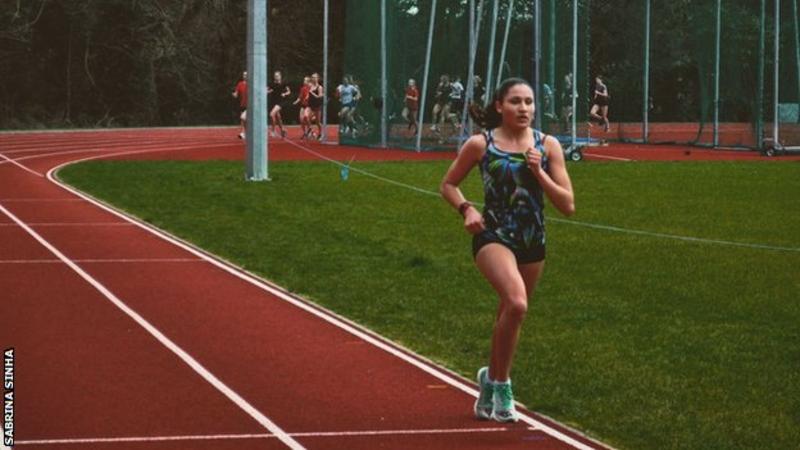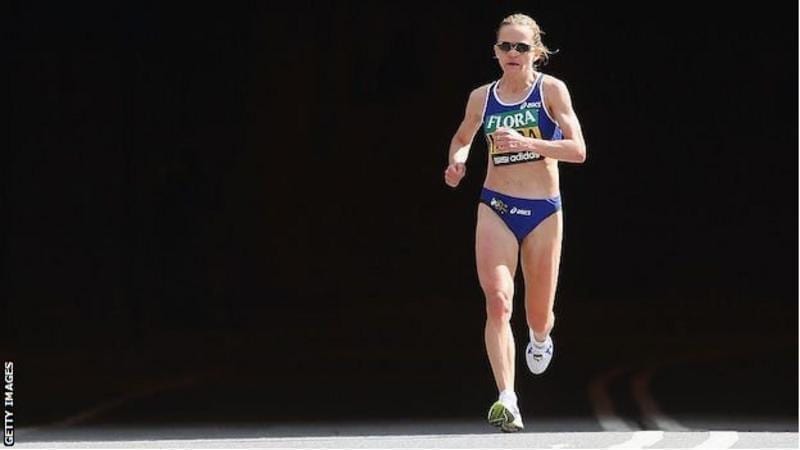“I almost learned to live with it and to accept that this was a normal reality that I would have to face my whole life.”By Katie Falkingham
BBC Sport
It’s a sentiment that many women will relate to, and one which could be applied to many aspects of life.

But, since the death of Sarah Everard, who disappeared as she walked home in London, women are sharing their anger, frustration and fear, reflecting on their own experiences of walking alone and their need to #ReclaimTheseStreets.
Among them, several female athletes have been sharing their experiences of training. Here, two of them speak to the BBC.
‘My father apologised to me on behalf of men’
British middle distance and cross-country athlete Sabrina Sinha
I started running about age 11, and since then I have been cat-called, shouted at, and had cars slow down by me. I was a very lanky kid and certainly looked like a kid, but it didn’t stop anyone from doing anything.
This was only when I was on my own or with a female running partner or even a group of girls. It’s literally never happened when I was running with a boy.
I think for me it’s probably happened on more runs than it hasn’t happened.
My sister is also an athlete and it would happen constantly when we were on runs together. We didn’t tell our parents until at least two years later, because we just accepted that this was a normal reality to face despite being really young.
I didn’t know any better until I spoke to my parents and they said this is not acceptable. My father actually apologised to both me and my sister on behalf of men.
I’ve had before when me and my sister were on a run, a car slowed down next to us and it was a group of guys. They said: “Come on girls, you look amazing, you want to come and join us?”
There isn’t a lot we can do with it, so even though it is not OK, we’ve had to accept it. I’ve had to change my own behaviour.
I try to limit running in shorts because I don’t feel comfortable, but once it gets to the summer it is so hot it’s really hard not to, therefore I’ll make sure that I wear a bit more on my top half, but I never run in a crop top.
I just don’t feel comfortable in my own body because I know for a fact that I would be heckled if I’m running in shorts and a vest.
I’m constantly on guard. I try to avoid secluded places but that’s quite hard because I do a volume of about 18km, if not more, on a run, so it’s quite hard to find routes that are constantly busy.
If it’s dark and I haven’t found a running partner by that time, very often I don’t run, so it has completely changed my routine because I can’t risk the danger of going out on my own in the dark.
I can’t believe how many of my male running friends have never even considered it a possibility, they are so unaware of what us females go through.
They could go running at any time of day and feel comfortable, so just even raising awareness to say “this is what is happening” so that they are looking out and being aware how we’re feeling, but also for girls to know they are not alone.
Sadly, I would actually say I’ve been very fortunate in my situation. My experiences have been horrendous, but I’ve been fortunate that nothing more has occurred. And that’s really sad because I shouldn’t have had to have been in any of those situations.
A lot of the time, I blame myself because we’ve been raised to accept that what we are wearing is the issue, or what we’re doing or how we look.
Mara Yamauchi represented Great Britain at the 2008 and 2012 Olympics
Former GB marathon runner and two-time Olympian Mara Yamauchi
I’ll be out training and ahead of me there’ll be a man running a bit slower than me. I catch him up and when I draw level he won’t let me go past.
He’ll latch on to my shoulder and then run right behind me for several minutes. Usually I speed up to try and drop him. Every time this happens I think, is this man just being competitive? Is he going to assault me? Should I stop and confront him? This has happened to me a few times and it happened to me on Thursday when I was running with a female friend.
No woman being treated like this knows whether this man latching on to them is completely benign or not.
Also, there’s a complete lack of consent from the woman. The man is effectively saying I’m going to gatecrash your training session without your permission – tough if you don’t like it.
If two women were playing tennis and a man just rocked up and said “I’m going to join your training session for five minutes” everyone would say no, you can’t do that. But in running this seems to happen all the time. I think because it’s in a public space.
From hearing stories of women who run, it’s clear that women are not safe while they’re running.
I’ve had the luxury of being a full-time athlete for many years so I always ran in the daytime. I don’t have to often run in the dark, but I completely relate to women feeling fearful.
This can be solved so easily. Men can just not latch on to women. But also education is really important; men just talking about this with their peers, saying “you just can’t do this, the women don’t know what your intent is”. It’s totally unnecessary and creates unnecessary anxiety for the women.
We can all do better. It’s easy to think “I would never do that, so it’s nothing to do with me”. But you can help other people to not do it.
Mara Yamauchi was speaking to BBC Radio 5 Live.

